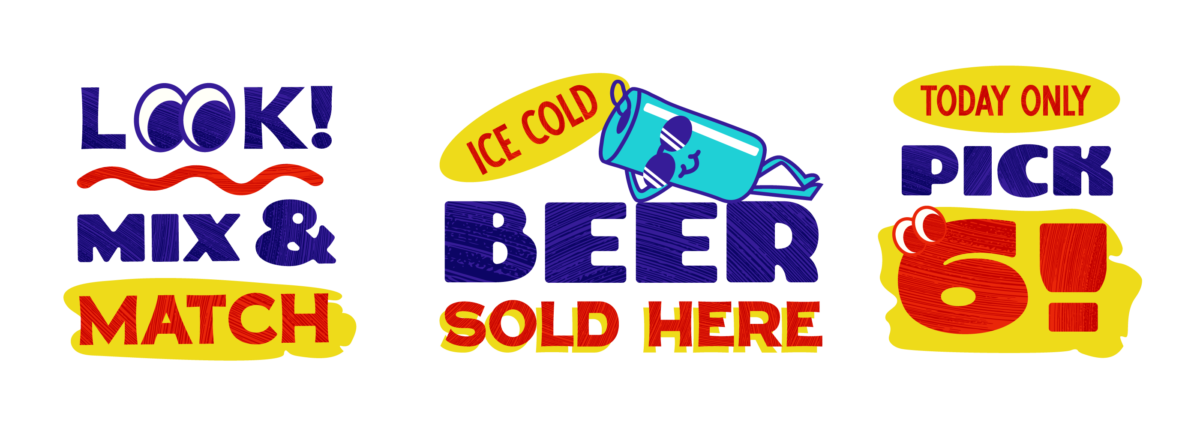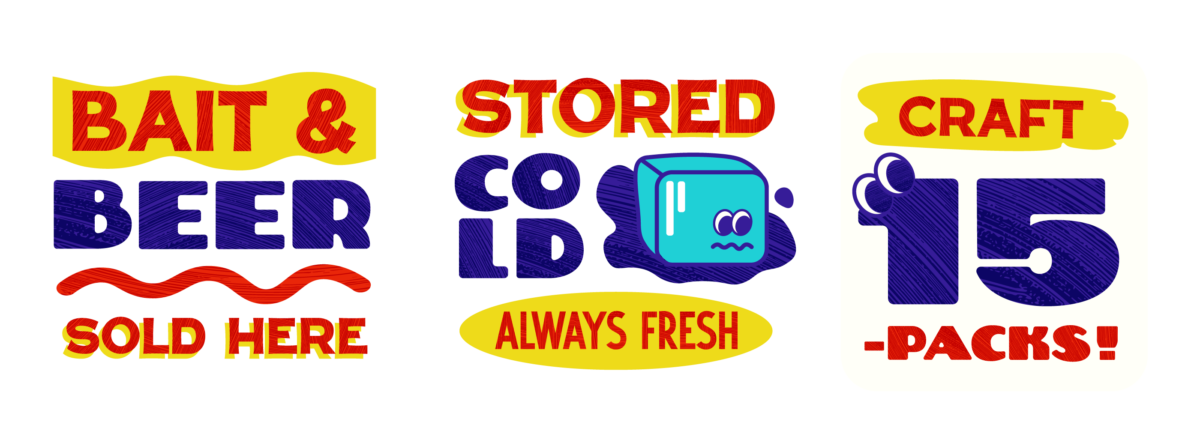Resources
How Craft Beer Can Compete (and win) in Grocery Stores
How to sell more beer in large chain retail, common mistakes to avoid and the most important employee at a brewery
Selling craft beer in grocery stores can be a great path towards growth, provided you get everything right. Your beer needs to be well made, consistent and shelf stable. Your branding and packaging need to be excellent (you’re competing with local craft, big craft, fake craft and Big Beer). And you need to be able to brew enough volume to keep the channel stocked.
We’ve helped a few of our brewery clients make the leap from small, independent grocery and bottle shops to large chain retail over the last few years. And we wanted to sit down with a distributor who focuses on this channel to get an idea of what they see working (and not working) in this space.
Enter David Mahaffa, Director of Craft Beer for Zink Distributing out of Indianapolis, Indiana. David recently started working with longstanding CODO client, Big Lug Brewing, to bring them to grocery stores throughout central Indiana.
David drops some important knowledge, tips and best practices here. If your brewery is thinking about partnering with a distributor or selling in grocery stores—this piece is for you.


Hi David. Please introduce yourself and Zink Distributing.
 David
David
Hello! I am David Mahaffa and I am the Director of Craft Beer for Zink Distributing Co. in Indianapolis, Indiana. Zink Distributing is a full-service beverage wholesaler who sells beer, wine, & non-alcoholic beverages. Our anchor brand is Anheuser-Busch but we have one of the best, top-to-bottom, craft beer portfolios you will find anywhere.

I wanted to have you by to discuss your work with Big Lug Brewing. You’ve helped to get them into large grocery retail and I’d like to use that as a jumping off point. To start, why was Zink excited to partner with Big Lug? What about their team, their beer and their brand made you feel like it was a great fit?
 David
David
Big Lug fit all the criteria that we at Zink look for in a brewery partner. Big Lug’s beer is exceptional, Big Lug’s people are smart and understand their business and ours, and Big Lug’s marketing/branding is excellent.

What should a brewery be thinking about if they want to succeed in grocery store sales? (e.g. volume, branding, quality control)
 David
David
A brewery should understand who they are as a business before entering the grocery space. A brewery needs to be completely objective and honest with itself about their true capabilities. How are the brewery’s sales OUTSIDE of their tap rooms? How are the brewery’s sales in the “easy” places to get into? Are buyer’s in bars/restaurants/bottle shops wanting more of your product consistently? How well does the brewery’s beer sell in places that are not craft beer-centric? Can the brewery really handle the increase in volume that will come with entering the grocery space? If the true and honest answer to any of those questions is negative, then the brewery should reevaluate themselves and their product before attempting to penetrate the grocery segment.

Is there a proven strategy for succeeding in grocery store craft beer aisle?
 David
David
I would not say that there is a proven strategy but the most successful breweries in grocery, that I have seen, are ones that were doing well before they began selling in the grocery segment. Breweries that sold well in grocery already had a high-level of consumer awareness before being placed on grocery store’s shelves and that contributed greatly to consistent in-store sales which in turn gave the brewery more attention from the corporate buyers and planners.

What are some big differences between large chain retail and smaller bottle shops / liquor stores?
 David
David
There are many differences between large chains and smaller liquor stores but the major one is logistics. At a small bottle shop a brewery sales rep can often walk-in, sample and sell the owner/buyer, and then send the shop beer, sometimes as soon as that day. At a large chain, things are significantly more complicated. Most large grocery chains only accept new product onto their shelves twice a year, in the spring and then again in the fall. There is then a several-month-long process that a brewery will need to navigate to sell beer to a grocery chain each time, every year. Then, to top it all off, each grocery chain has its own systems, paperwork, language, and requirements that the brewery will have to learn and complete each time the brewery wishes to get a beer of theirs authorized for sale. Zink is very lucky to have an incredibly talented team who manage all these requirements but even for folks who handle this every day this is a daunting task.


Build a stronger brand.
Sell more beer.
Join 7,500+ other beer industry folks and sign up for our monthly Beer Branding Trends Newsletter.

Beer Branding Trends 2.0

Indiana laws notwithstanding, where do you stand on cold vs warm beer sales? Does this matter to distributors?
 David
David
It is not a secret that beer stores better when it is cold, and most distributors spend a fortune on climate-controlled warehouses and giant refrigerated rooms to keep beer as fresh as possible for as long as possible. With that being said, I am of the belief that if a brewery’s beer cannot remain stable and fresh at room temperature for at least 60-days then they should not be selling their product outside of their tap room.

As a consumer, I like the mixed pack “Pick 6” service you can find at most grocery stores. Do you think craft breweries should be taking part in this (assuming they have a say in how their beer is sold off premise)?
 David
David
Absolutely, mix-and-match buying opportunities are a great way to get consumers to give a brewery’s beer a chance. This is especially true at grocery stores where the average shopper is statistically less likely to have heard of a particular brewery. The only thing a brewery would need to be aware of is how the store handles their “Pick 6” UPCs. If the brewery uses Packtech- tops then the UPC on the can/bottle will ring at the register as a 6-pack but most places that sell beer individually have a work around and the brewery just needs to learn what that work around is.

What resources (marketing, or otherwise) do you like your brewery partners to bring to the table to help you do your job better?
 David
David
Ideally, by the time a brewery gets to Zink, the brewery either has an in-house marketing team or is working with a firm like CODO. It cannot be overstated how important marketing is to a brewery in this day-and-age. I think a lot of people get into this business and believe that their beer will sell itself based on taste alone and, while that used to often be the case, the current marketplace has a lot of breweries, with many brands each, so breweries must be able to tell their story effectively in a space that is approximately two cans wide.

Have you ever told a brewery partner that they should rebrand or refresh their packaging?
 David
David
Yes, we have. The last five to seven years have seen a lot of new entrants to the market and those new breweries often have very modern marketing, so the old guard of breweries have needed to step their game up, in a significant and impactful way, or risk getting left behind.

Do you ever look at adjacent categories (e.g., hard seltzer, kombucha) and suggest your breweries to start producing those products or is that entirely driven by the breweries themselves?
 David
David
Zink wants its brewery partners to do whatever the brewery believes will bring them the most success. If the brewery really believes in something, then we at Zink will do our best to help build that idea. I think what a brewery needs to ask itself, though, is are they passionate about those categories and products? Does a brewer, or brewery-owner, really enjoy hard seltzer, hard lemonade, or kombucha and do they believe their brewery can do it better or would producing one of those products just be a cash-grab? What resources is a brewery taking away from what they do well to put into something new? Is it worth it to redirect those funds or that time? What if a brewery doubled down on their second best-selling product and built that brand up? There are no wrong answers, at least at first, but I have seen businesses chase trends, end up losing sight of what got them to where they are in the first place, and then ending up worse off for the effort.

Can craft beer succeed in convenience stores or is that the domain of big beer and value-driven impulse buys? (I buy a Four Loko every night on my way home, for instance.)
 David
David
I am sure you meant to say you buy a delicious Natty Rush (Now in Lemonade!) on your way home, but I will let it slide. Yes, absolutely! There are convenience stores and gas stations that are extremely successful selling craft beer. For instance, I know of a gas station in northern Michigan that breweries have made specialty beer for. Zink has a few gas stations and convenience stores located in more remote areas, with fewer shopping options, that do well selling craft beer.

Obviously I meant to say that I buy a (Lemonade) Natty Rush each night. Okay, setting aside COGs (and assuming the brewery is profiting), is the $9.99 price point an important threshold to aim for in grocery? (Or does this not matter—Ballast Point famously sold Sculpin at $15.99 per 6-pack for years.)
 David
David
I am a firm believer that a brewery’s beer should be priced in a way that makes the brewery a sustainable profit. If a brewery’s beer is worth the cost, then customers will pay whatever it takes to get it. Just remember, though, that first impressions are everything. If a beer is $17.99 a six-pack then it had better be worth the cost or customers might not come back to not just that beer but potentially any beer that the brewery makes. I would say that as much research and thought should go into your pricing strategy as what goes into your brewing decisions.


If a brewery comes to you with an idea to launch a 12-pack, what are your initial thoughts? Should that be a variety pack, or the leading beer brand? Or whichever brand can bring the highest margin?
 David
David
The first thing that needs to be considered is how well a brewery’s smaller pack sizes are doing. If a brewery is struggling to sell their four-packs or six-packs, then investing in 12-packs is probably not wise. The flip side to this reasoning is what if a brewery’s six-packs are flying off the shelf? Larger size packages are often less profitable, per case, due to the cost of creating of the packaging itself and the need to sell the larger pack sizes at a lower price, so the consumer sees the value.
As far as what the larger pack size should be, at least at first, a brewery’s best bet is variety packs or their best- selling beer OUTSIDE of their tap room. Just keep in mind, should a brewery choose variety packs, that variety packs are lower margin due to either being hand-packed individually or put together by a million-dollar machine. If a brewery chooses to go with a best-selling beer, in a larger pack, be sure that beer is something that consumers want twelve of at a time.

Would you rather see a brewery bring a 15-pack or a 12-pack to grocery? Why?
 David
David
I do not think it really matters but keep in mind that if a brewery gets into 15-packs then they are going to go head-to-head with some major-league breweries who have a lot more wiggle room in their profitability than the average craft brewery.

What is one misconception most breweries have about distributors?
 David
David
The biggest misconception, in my opinion, that breweries have about distributors is that distributors are a magic wand that, once waved, will make the brewery’s life easier. The reality of a distributor/brewery relationship is much more complex. Distributors have a lot of processes that a brewery is going to need to understand and navigate. For instance, if a brewery was self-distributing, before partnering with a distributor, then that brewery might be used to delivering beer to an account whenever the account is in need whereas a distributor potentially has a set delivery day for that account that is difficult to bypass. Like many other parts of a brewery’s business, there is a direct correlation between how much effort a brewery puts into a distributor as to what a brewery gets out of their distributor. This is as true with 35 million case/year distributors as it is with 35,000 case/year boutique distributors.

What are the most common mistakes you see when breweries approach you about carrying their products?
 David
David
The biggest mistake a brewery can make when approaching us is not knowing their beer is bad. This can often be difficult for a brewer to understand because very few people have ever been totally honest about the product so as not to offend or distress the brewer. I have been the first person to call a beer “bad” or “poorly constructed” to a brewer’s face before and that is never a fun time. If there is only one take-away from these rambling, and overly long, answers it should be this: the most important employee at a brewery is the brewer. If a brewer is not good at their job then the brewery will, without question, eventually fail. The quality of a brewery’s product is paramount to their success. Please take the time to do the necessary research, find someone with the training and experience necessary, taste the beers they have made on a large-scale brewing system, and then pay that brewer what they are worth. It is always astonishing to me that a good, smart businessperson will spend hundreds of thousands, if not millions of dollars on a brewery, but then hire a brewer with only largely home-brewing experience for $35,000 a year. Can you imagine if someone spent half-a-billion dollars on an F1 team and then asked their friend who works at the local putt-putt course/go-kart track to drive the car? You would think that racing team owner was insane, but this similar situation happens all the time in the beer space.

Is there anything you see that automatically DQs a brewery from working with you?
 David
David
The only automatic disqualifications are bad beer or offensive marketing. We are not a prudish company but if I would be uncomfortable showing your beer label to Mrs. Rita Zink then we will politely pass on a future partnership.
The most important employee at a brewery is the brewer.

You have the opportunity to bring on one new brewery from two similar brands—similar reputation, beer quality, portfolio and annual production. What are you looking for to decide between the two?
 David
David
Our decision would come down to the brewery’s people. How a brewery runs its business is directly reflected in the people the brewery employs. If the people we meet during the interview process are passionate about what they do then they will make that abundantly clear in their words and actions. The easiest way to make a judgement about a brewery, and probably any business, is how their employees talk about where they work and what they do.

How important is packaging to you when deciding whether or not to partner with a new brand?
 David
David
It is very important. If a brewery’s marketing is not immediately appealing, then there would need to be a lot of other positive factors for Zink to consider entering a partnership with that brewery.

What is the biggest threat facing the craft beer industry today?
 David
David
The biggest threat facing the craft beer industry today is debt. 90% of the breweries in the United States are one bad batch of beer away from going bankrupt and COVID-19 has added a whole new set of financial problems that breweries must face. That is not to say a brewery cannot responsibly take on debt, they can, but a brewery should have an extremely clear path forward for their business before doing so.

Do you have any advice, branding or otherwise, for people who are considering a partnership with a distributor?
 David
David
I would say be ready to work hard, be patient when you are teaching, and be humble when you are learning. A distributor and a brewery will have a lot to learn from one another and both parties need to put in the time and effort to figure out what those things are.

Build a stronger brand.
Sell more beer.
Join 7,500+ other beer industry folks and sign up for our monthly Beer Branding Trends Newsletter.
